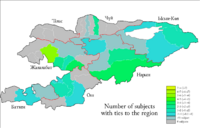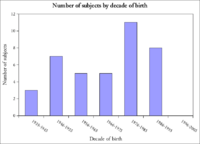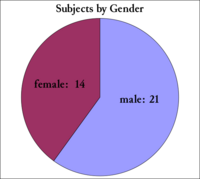Phonetic Survey of Kyrgyz Dialects: Difference between revisions
Firespeaker (talk | contribs) |
Firespeaker (talk | contribs) No edit summary |
||
| Line 1: | Line 1: | ||
This page organises and shows off my research on '''the phonetics of Kyrgyz dialects''' which I am conducting in the 2007-2008 academic year on a Fulbright grant. | This page organises and shows off my research on '''the phonetics of Kyrgyz dialects''' which I am conducting in the 2007-2008 academic year on a Fulbright grant. | ||
== Local research conditions == | |||
=== Interaction with local scholars === | |||
Fulbright scholars are supposed to declare a "host institution". Based on a suggestion from Elmira and some research on my own online, I decided to declare Бишкек Гуманитарный Университет (БГУ - Bishkek Humanities University) as my host institution. | |||
I went there at some point early in my grant, but after having learned some Kyrgyz (early December?), to meet with the scholars there and discuss my project with them. I managed to track down the guy Elmira had mentioned studying under, and set up a meeting with him (later that week / the following week). After explaining what I was looking at to him, and having him explain a few gaps in my knowledge to me, he all but told me he didn't think there was anything left to learn by doing phonetic fieldwork on Kyrgyz dialects and showed me some books I might be interested (mostly on literature, but the main one on dialects I already had). He told me about the primary work on Kyrgyz dialects, which I'd seen in Osh, and which I'd alraedy vowed to get my hands on a copy of. As I was getting ready to leave, I asked if he had any students who might be interested in working with me--maybe getting a copublication or course credit out of it--and his answer was, "You mean grad students." Of course. He said he had a small class studying dialects (which I was interested in sitting in on, but I got the impression that the idea made him uncomfortable), and maybe someone would be interested. Sure, he'd introduce me--some day. I left and never saw him again. | |||
Later, this one guy (the brother of this Kyrgyz girl living in Turkey who'd stalked me through [http://kyrgyz.us|kyrgyz.us] and had been talking with me) introduced me to this one scholar at the Академия наук (Sciences academy). This scholar knew some things about dialects, but maybe not much more than the average educated Kyrgyz--just with some academic framework around it. He decided to introduce me to another scholar, who apparently wrote a book on the phonetics of Kyrgyz dialects. I met with him a couple times, told him about what I was interested in doing, and got told that "we don't do that anymore; it's too hard." And also that he'd written the book on that, and didn't think there was anything more to learn about it. He gave me a disk "with his book on it" (turned out just to be the table of contents), which I returned to him the next time I saw him--at the grand opening for a new center on language issues at the academy of sciences which he was somehow involved with and invited me to, basically to show off this American Kyrgyz speaker to all these Kyrgyz-speaking patriots. Also, it was an interesting day-long conference, and I got involved in some interesting discussions about the sad state of materials on the Kyrgyz language with some Kyrgyz teachers. And met a French computational linguist who was "teaching language and computers" (a joke to him) at the academy of science. And who had been making efforts to learn Kyrgyz for much longer than I had been, and had barely hit the basics. Also, this scholar I'd met with did promise to get me a copy of his book, but I never got it: I ran out of time to meet with him again, and my primary research was much more important. | |||
=== Library access === | |||
The first time I went to the national library, some time in November, I was turned away because I didn't have my passport. I wasn't even allowed to enter beyond the lobby. | |||
Over Thanksgiving I went to Osh, where one rainy afternoon, I stopped by the regional library, which was right down the road from Thatcher's place where I was staying. I went in, asked for books on Kyrgyz dialects, got a funny look and asked what I meant, repeated it, and about a minute later got handed a copy of The Work on Kyrgyz dialects. I flipped through it for like an hour, writing down page numbers (and ranges..) in the hopes of getting it copied. I really wanted to just buy the whole thing (which I heard was possible), but I couldn't even bring myself to ask such a ridiculous question. Instead, the lady copied the parts of it for me that I requested. She had very little clue how to operate their desk-top copying machine, which was very low on toner and seemed unhappy about the cheap paper it was being fed. | |||
Upon my return to Bishkek, I vowed to go back to the national library, but didn't get a chance before new year's. | |||
== Human Subjects == | == Human Subjects == | ||
Revision as of 19:29, 29 September 2008
This page organises and shows off my research on the phonetics of Kyrgyz dialects which I am conducting in the 2007-2008 academic year on a Fulbright grant.
Local research conditions
Interaction with local scholars
Fulbright scholars are supposed to declare a "host institution". Based on a suggestion from Elmira and some research on my own online, I decided to declare Бишкек Гуманитарный Университет (БГУ - Bishkek Humanities University) as my host institution.
I went there at some point early in my grant, but after having learned some Kyrgyz (early December?), to meet with the scholars there and discuss my project with them. I managed to track down the guy Elmira had mentioned studying under, and set up a meeting with him (later that week / the following week). After explaining what I was looking at to him, and having him explain a few gaps in my knowledge to me, he all but told me he didn't think there was anything left to learn by doing phonetic fieldwork on Kyrgyz dialects and showed me some books I might be interested (mostly on literature, but the main one on dialects I already had). He told me about the primary work on Kyrgyz dialects, which I'd seen in Osh, and which I'd alraedy vowed to get my hands on a copy of. As I was getting ready to leave, I asked if he had any students who might be interested in working with me--maybe getting a copublication or course credit out of it--and his answer was, "You mean grad students." Of course. He said he had a small class studying dialects (which I was interested in sitting in on, but I got the impression that the idea made him uncomfortable), and maybe someone would be interested. Sure, he'd introduce me--some day. I left and never saw him again.
Later, this one guy (the brother of this Kyrgyz girl living in Turkey who'd stalked me through [1] and had been talking with me) introduced me to this one scholar at the Академия наук (Sciences academy). This scholar knew some things about dialects, but maybe not much more than the average educated Kyrgyz--just with some academic framework around it. He decided to introduce me to another scholar, who apparently wrote a book on the phonetics of Kyrgyz dialects. I met with him a couple times, told him about what I was interested in doing, and got told that "we don't do that anymore; it's too hard." And also that he'd written the book on that, and didn't think there was anything more to learn about it. He gave me a disk "with his book on it" (turned out just to be the table of contents), which I returned to him the next time I saw him--at the grand opening for a new center on language issues at the academy of sciences which he was somehow involved with and invited me to, basically to show off this American Kyrgyz speaker to all these Kyrgyz-speaking patriots. Also, it was an interesting day-long conference, and I got involved in some interesting discussions about the sad state of materials on the Kyrgyz language with some Kyrgyz teachers. And met a French computational linguist who was "teaching language and computers" (a joke to him) at the academy of science. And who had been making efforts to learn Kyrgyz for much longer than I had been, and had barely hit the basics. Also, this scholar I'd met with did promise to get me a copy of his book, but I never got it: I ran out of time to meet with him again, and my primary research was much more important.
Library access
The first time I went to the national library, some time in November, I was turned away because I didn't have my passport. I wasn't even allowed to enter beyond the lobby.
Over Thanksgiving I went to Osh, where one rainy afternoon, I stopped by the regional library, which was right down the road from Thatcher's place where I was staying. I went in, asked for books on Kyrgyz dialects, got a funny look and asked what I meant, repeated it, and about a minute later got handed a copy of The Work on Kyrgyz dialects. I flipped through it for like an hour, writing down page numbers (and ranges..) in the hopes of getting it copied. I really wanted to just buy the whole thing (which I heard was possible), but I couldn't even bring myself to ask such a ridiculous question. Instead, the lady copied the parts of it for me that I requested. She had very little clue how to operate their desk-top copying machine, which was very low on toner and seemed unhappy about the cheap paper it was being fed.
Upon my return to Bishkek, I vowed to go back to the national library, but didn't get a chance before new year's.
Human Subjects
After determining how I was going to conduct my project, I applied for human subjects approval. This was finally granted in April. My questionnaires and consent forms, as well as some sample images were approved.
Preparation
- Decide what topics to examine most closely (Things to look at in Kyrgyz dialects#Linguistic topics)
- Decide what word forms/patterns would fit these topics (Things to look at in Kyrgyz dialects#List of forms to elicit)
- Find words to match these patterns (Things to look at in Kyrgyz dialects#Organising Wordlist)
- Organise words, weed out unneeded, add extra (Things to look at in Kyrgyz dialects#Final Wordlist)
- Take pictures of words found
- Print pictures
Elicitation
Results



This section shows off my results. At this point, there's just some demographic data of the 35 subjects, as of the end of the fieldwork, including a map of subjects' regional affiliations, a graph of age distribution of subjects based on year of birth, and a graph showing distribution of subjects by gender.